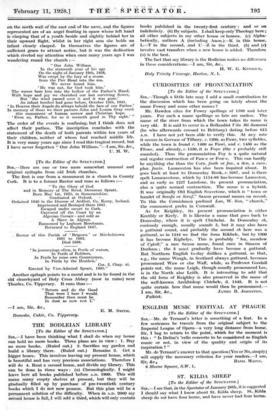CURIOSITIES OF PRONUNCIATION
[To the Editor of the SPECTATOR.] Sia,—Though a little late may I add a small contribution to the discussion which has been going on lately about the name Fowey and some other names ?
Mr. Bawden cites for Fowey spellings of 1598 and later years. For such a name spellings so late are useless. The name of the river from which the town takes its name is very old. It is said to occur in a Bollandist Vita Sti Samsoni (he who afterwards crossed to Brittany) dating before 615 A.D. I have not yet been able to verify this. At any rate it occurs in Gervase of Tilbury, c. 1200, as Fawe, two syllables, while the town is found c. 1400 as Fawi, and c. 1450 as the Ffowe, and already, c. 1580, it is Foye (the e probably still sounded). Thus the pronunciation Foy is a quite natural and regular contraction of Faw-e or Fow-e. This can hardly be anything else than the Corn. foath or fow, a den, a cave, plur. fowls. Launceston has also been inquired about. It goes back at least to Domesday Book, c. 1087, and is there spelt Lanscavetone, which by 1154-89 has become Lanceston, and as early as 1227 Lanstone, its present pronunciation, also a quite normal contraction. The name is a hybrid. It was originally Old English Scavetone, which is " town or himlet of Sceafa or Sceaf," Saxon personal names on record. To this the Cornishmen prefixed Lan, W. Ilan, " church,' the commonest prefix in Cornwall.
As for Keighley, its present pronunciation is either Keethly or Keely. It is likewise a name that goes back to Domesday, where it is spelt Chichelai. In Domesday ch, curiously enough, usually sounds k, but it may also have a guttural sound, and probably the second ch here was a guttural, as in 1244 we find the form Kikhele, but by 1300 it has become Kighelye. This is probably " lea, meadow of Cykell," a rare Saxon name, found once in Simeon of Durham ; the k must gradually have become a guttural. But Northern English to-clay dislikes a guttural, so that, e.g., the name Waugh, in Scotland always guttural, becomes pronounced Waw or else Waff, while, as Professor Goodall points out, the name Leigh, though usually pronounced Lee, is in the North also Leith. It is interesting to add that the old form of Keighley is also preserved in the name of the well-known Archbishop Chichele, d. 1448. It is not quite certain how that name would then be pronounced.—






































 Previous page
Previous page